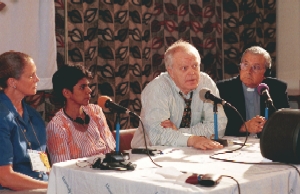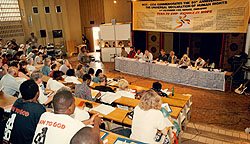The assembly adopted major statements on "The Status of Jerusalem"
and on "Child Soldiers".
After hearing that more than 300,000 children under the age of 18 are currently engaged in armed
conflicts around the world, delegates called for "an immediate moratorium on the recruitment and
participation of children as soldiers and the demobilization of existing child soldiers".
The statement on Jerusalem declares that:
* Jerusalem is a holy city for three major religions -- Judaism, Christianity and Islam;
* a solution for the "question of Jerusalem" is essential to any negotiated peace agreement in the
Middle East;
* negotiations on the future status of Jerusalem must be undertaken without delay;
* any agreement on Jerusalem should assure free access to holy places and equal rights of citizenship
for both Palestinians and Israelis.
At a subsequent press conference, the moderator noted that while Christians are called to forgive, forgiveness comes in response to confession. "If the violators of human rights are not confessing their sins, we have to pursue legal actions." In response to a question about what measures should be taken against such persons, WCC general secretary Konrad Raiser stressed that "the WCC has clearly rejected capital punishment as a form of punishment".

|
Ambassador Thomas Hammerberg from Sweden and Bishop Aldo Echegoyen from Argentina give a
press conference on human rights Photo by Chris Black/WCC. Click on the photo to order (ref. 7140.13s) |
The assembly observed the 50th anniversary of the United Nations' adoption of the Universal
Declaration of Human Rights with a special ceremony on 10 December. Delegates adopted a statement praising the UN Declaration and recommitting the WCC to
uphold its principles.
Among other things, the statement:
Padare on the 50th anniversary of the signing of the
Photo by Chris Black/WCC
Later in the assembly delegates approved a more comprehensive statement on
human rights, expressing support for the rights of women, uprooted people, indigenous people
and people with disabilities.

Universal Declaration of Human Rights
Click on the photo to order (ref. 7141-14a)
